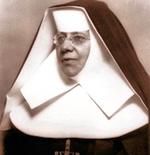Fathers of the Church
Epistle XX: to Marinianus, Bishop of Ravenna
Description
This epistle is from Book VIII of the
Register of the Epistles of Saint Gregory the Great. Here Gregory asks Marinianus to extend his protection to a woman residing in his precinct.
Provenance
St. Gregory (b. 540 in Rome) was elected pope at the age of 50, serving from 590 to 604. In 14 years he accomplished much for the Church. England owes her conversion to him. At a period when the invasion of the barbarian Lombards created a new situation in Europe, he played a great part in winning them for Christ. At the same time, he watched equally over the holiness of the clergy and the maintenance of Church discipline, the temporal interests of his people of Rome and the spiritual interests of all Christendom. He removed unworthy priests from office, forbade the taking of money for many services, and emptied the papal treasury to ransom prisoners of the Lombards and to care for persecuted Jews and victims of plague and famine. Gregory also reformed the liturgy, and it still contains several of his most beautiful prayers. The name "Gregorian chant" recalls this great Pope's work in the development of the Church's music. His commentaries on Holy Scripture exercised a considerable influence on Christian thought in the Middle Ages. Following his death in 604, his numerous epistles, including the following letter, were compiled into the Papal Register of Letters.
by Gregory the Great in 590-604 | translated by James Barmby, D.d
Gregory to Marinianus, &c.
John, the bearer of these presents, complains that his wife, flying from the molestations of one George, has long been residing within venerable precincts , and has so far met with no assistance. Since she asserts that there is a dispute about her condition , and has asked that it should be commended to your Fraternity, we hereby exhort you that you afford your protection to this woman, and permit her not to be in any way aggrieved by any one unreasonably. But if the question about her station still continues, let it be your care that, without any oppression, and in a legal manner, it may be submitted for judgment; so that when, after ascertainment of the truth, what is agreeable to the order of law has been determined, neither party may complain of having suffered wrong. The month of May, first Indiction.
Taken from "The Early Church Fathers and Other Works" originally published by Wm. B. Eerdmans Pub. Co. in English in Edinburgh, Scotland, beginning in 1867. (LNPF II/XII, Schaff and Wace). The digital version is by The Electronic Bible Society, P.O. Box 701356, Dallas, TX 75370, 214-407-WORD.
To Fathers of the Church home page



